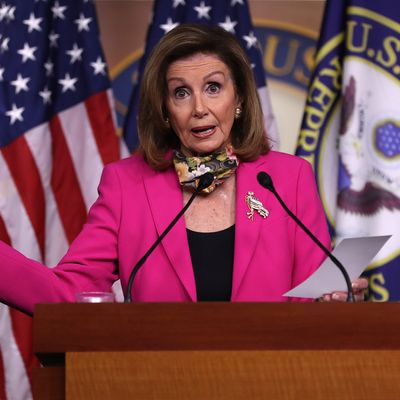
A relatively brief moment of peril for standard federal government operations ended Tuesday when the House passed a stopgap spending bill to keep Washington humming beyond the September 30 end of the fiscal year (at least until December 11). As Roll Call reports, Speaker Pelosi caved on money for the Commodity Credit Corporation fund Trump has been tapping to compensate farmers hurt by his trade policies, in exchange for some Republican concessions:
The House swiftly passed a stopgap funding measure needed to avert a partial government shutdown in eight days after top congressional leaders reached a deal resolving a fight over farm payments.
On a lopsided vote of 359-57, the House sent to the Senate a revised continuing resolution that would extend current funding for all federal agencies through Dec. 11 …
The bipartisan pact would restore money for farm payments sought by lawmakers from both parties that House leaders had rejected in an earlier stopgap measure introduced Monday. It also would restore new money for a pandemic-related program funding subsidized meals to children who would normally receive them when schools are open, among other nutrition assistance, Democrats said.
There was apparently enough Democratic pressure for the farm aid to convince Pelosi to back off an earlier objection to Trump’s use of CCC funds, which would shower dollars on heartland voters just before the election. But she did get some language stopping POTUS from using the same funds to benefit fossil-fuel refiners.
The Republican-controlled Senate, where the earlier deletion of farm aid was a potential deal-breaker, is expected to pass the bill within the next few days. There’s no reason for Trump to consider vetoing it.
The continuing resolution, as the stopgap is known, mostly continues current spending levels for federal programs pending enactment of appropriations bills between now and the CR’s expiration date of December 11. Depending on what happens on Election Day, and whether control of the White House and Congress is quickly determined, the “lame duck” session to which the appropriations can has been kicked could be more contentious than usual.






























